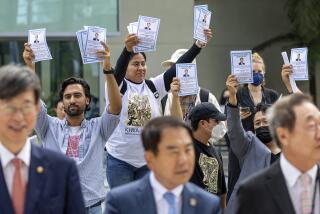Economic Fanaticism Is Bad for Seoul
- Share via
The most dangerous kind of “jihadists” are not the religious ones. Today, the economic fundamentalists--the contemporary American free-market globalizers and the older Leninists--are the real fanatics. Nothing, not even economic disaster, will dissuade them from the belief that their doctrines are the absolute truth. The U.S. Treasury and its puppet, the International Monetary Fund, fall into this category.
Unless South Korea resists such doctrinaire thinking, it is in danger of repeating its own near-meltdown of 1997. That disaster, as well as the financial crises of the past few years in Mexico, Indonesia, Thailand, Brazil, Russia and Argentina, all occurred while these countries were dutifully following the “Washington consensus.” This Anglo-American economic model, propounded by the U.S. Treasury and the IMF, calls for opening foreign countries to international capital while cutting back on wages, safety nets and services to ordinary citizens.
At the moment, the South Korean economy is growing better than most economies worldwide, based on domestic sales and exports to China. But some market analysts in Seoul, blinded by the Washington consensus, want Korean firms to more closely adhere to U.S. standards in corporate governance. If Korea follows this advice, it most likely will be overcome again by economic chaos.
The IMF’s former managing director, Michel Camdessus, charged that South Korea’s 1997 economic crisis was caused in part by “crony capitalism,” by which he meant the East Asian model of close collaboration between government, banks and big business to achieve national economic goals and maintain high employment.
But what exactly are U.S. standards of corporate governance? The recent bankruptcy of the Enron Corp., the United States’ seventh-largest corporation before its collapse, offers insights into the Anglo-American alternative. Enron made political contributions to George W. Bush, three-fourths of the U.S. Senate and almost half of the House of Representatives. Its actions may cheat its 4,000 employees out of their pensions. It may have colluded with its accounting firm to cover up sham profits.
Rather than “crony capitalism,” the U.S. offers an example of what should be called “organized crime.” The remedy for crony capitalism is effective law enforcement, not IMF demands that the interests of foreign investors be protected before all others. But there is no known remedy for American-style “organized crime,” which suggests that the U.S. days of economic hegemony may be numbered.
Models do matter, but South Korea needs to develop an economic model designed for its particular problems. South Korea needs to do the following:
It needs to ensure its ability to compete with China over the long haul, because China can manufacture anything more cheaply than any other nation; it needs to innovate products that are not only high tech but that also create new standards and are thereby invulnerable to reverse engineering; and it needs to become proficient in advanced services, including architecture, medical education, business planning, housing, fashion and entertainment.
South Korea’s most important long-term strategic problem is how to cultivate the Chinese market. It can take advantage of the fact that the Chinese do not hate Koreans the way they hate and envy the Japanese.
In 1994, South Korea, in response to the nagging of its patron, the U.S., abolished the main body for making economic policy. It also loosened virtually all controls over financial institutions. The result was a near-disaster for the economy. The immediate task is to reverse these self-inflicted wounds.
South Korea needs an economic planning body that will produce a strategy for the difficult years to come and not simply please the economic fanatics of the IMF.
More to Read
Inside the business of entertainment
The Wide Shot brings you news, analysis and insights on everything from streaming wars to production — and what it all means for the future.
You may occasionally receive promotional content from the Los Angeles Times.










